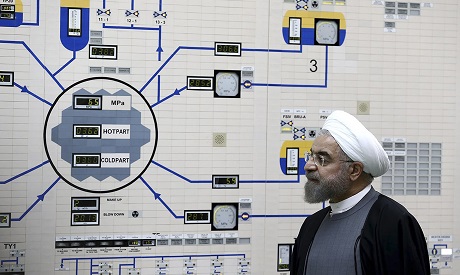
Rouhani reviewing nuclear chart .File Photo: AFP
Nuclear negotiations between Iran and world powers should resume in the coming weeks, the country's foreign ministry spokesman said Thursday on a visit to New York for the UN General Assembly.
Talks began in Vienna in April aimed at reviving a 2015 nuclear agreement between Tehran and world powers -- an accord left hanging by a thread after former US president Donald Trump unilaterally withdrew in 2018 and ramped up sanctions.
The discussions, which involve the remaining parties seeking to persuade Washington to rejoin the deal and Iran to return to its nuclear commitments, have been stalled since June, when ultraconservative Ebrahim Raisi was elected as Iran's president.
"The Vienna talks will resume soon, in the coming weeks," foreign ministry spokesman Said Khatibzadeh said, quoted by the official IRNA news agency.
Khatibzadeh said there were no plans for a multilateral meeting between Iran and the remaining parties -- China, France, Germany, Russia and the UK -- on the sidelines of the General Assembly.
But the "nuclear agreement and Vienna talks will be one of the main topics for bilateral meetings with the EU's head of diplomacy" Josep Borrell and foreign ministers of parties to the agreement, he added.
He did not specify which nations' top diplomats the Iranian delegation would meet with, noting that "not all" relevant foreign ministers were currently in New York.
The 2015 nuclear agreement offered Iran a reduction of UN sanctions in return for strict limits on its nuclear programme, but Tehran has progressively stepped away from its commitments in the wake of Trump's withdrawal and imposition of sanctions.
Trump's successor Joe Biden has signalled a willingness to return to the deal, which was negotiated when he was Barack Obama's vice-president and under Iran's moderate President Hassan Rouhani.
Hopes of a revitalised deal were kept alive earlier this month by Iran agreeing with the UN nuclear agency on a new compromise regarding surveillance of its nuclear sites.
International Atomic Energy Agency chief Rafael Grossi said at the time that move would provide "time" for "diplomacy".
Short link: